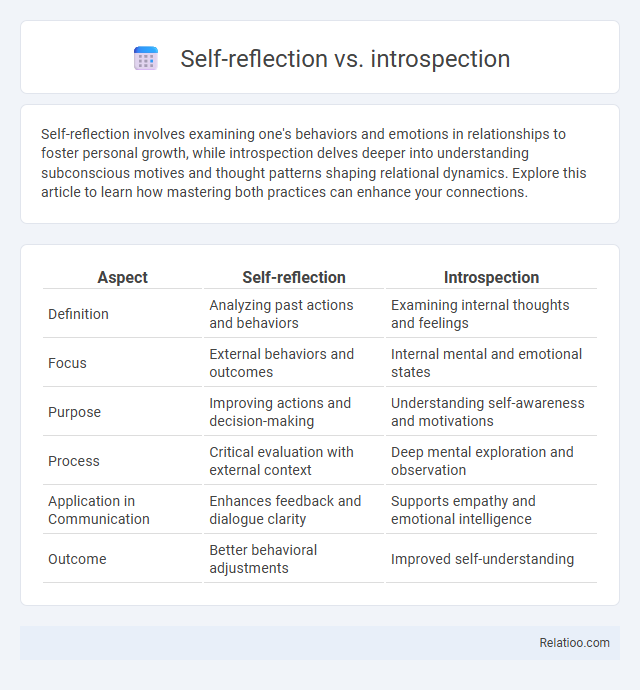Self-reflection involves examining one's behaviors and emotions in relationships to foster personal growth, while introspection delves deeper into understanding subconscious motives and thought patterns shaping relational dynamics. Explore this article to learn how mastering both practices can enhance your connections.
Table of Comparison
| Aspect | Self-reflection | Introspection |
|---|---|---|
| Definition | Analyzing past actions and behaviors | Examining internal thoughts and feelings |
| Focus | External behaviors and outcomes | Internal mental and emotional states |
| Purpose | Improving actions and decision-making | Understanding self-awareness and motivations |
| Process | Critical evaluation with external context | Deep mental exploration and observation |
| Application in Communication | Enhances feedback and dialogue clarity | Supports empathy and emotional intelligence |
| Outcome | Better behavioral adjustments | Improved self-understanding |
Understanding Self-Reflection: A Clear Definition
Self-reflection involves actively examining your thoughts, emotions, and behaviors to gain personal insights and foster growth. Introspection, often confused with self-reflection, is a broader inward-looking process focusing on observing mental states without necessarily analyzing them for change. Understanding self-reflection as a deliberate practice helps you identify patterns and make conscious decisions for improving your mindset and actions.
What Is Introspection? Meaning and Origins
Introspection is the process of examining one's own thoughts, feelings, and mental states, tracing its origins to ancient Greek philosophy, particularly the works of Socrates and Plato who emphasized self-knowledge. Unlike self-reflection, which often involves evaluating past actions to guide future behavior, introspection is a direct, internal observation of the mind's contents at a given moment. This method serves as a foundational technique in psychology and philosophy for understanding consciousness and self-awareness.
Key Differences Between Self-Reflection and Introspection
Self-reflection involves analyzing your actions and experiences to improve future behavior, while introspection focuses on examining your internal thoughts and feelings to gain self-knowledge. Your self-reflection is often outward-facing, assessing external outcomes and decisions, whereas introspection dives deep into the mind's inner workings and emotional states. Both processes aid personal growth, but understanding the key differences between self-reflection and introspection can help you apply each technique effectively for mental clarity and behavior adjustment.
The Psychological Benefits of Self-Reflection
Self-reflection, distinct from introspection and other self-examination methods, involves a deliberate process where you analyze personal experiences and behaviors to enhance self-awareness and emotional intelligence. Psychological benefits of self-reflection include reduced stress, improved decision-making, and heightened empathy by fostering a deeper understanding of your thoughts and feelings. Regular self-reflection encourages mental clarity and resilience, supporting emotional regulation and long-term well-being.
How Introspection Influences Personal Growth
Introspection deeply influences personal growth by encouraging You to examine thoughts, emotions, and motivations, leading to heightened self-awareness and emotional intelligence. Unlike self-reflection, which reviews past experiences, introspection explores internal cognitive processes, fostering meaningful behavioral change and emotional regulation. This conscious internal inquiry equips individuals to identify areas for improvement and align actions with core values, accelerating personal development.
Practical Exercises for Effective Self-Reflection
Practical exercises for effective self-reflection include journaling thoughts and emotions daily to identify patterns, engaging in guided meditations that prompt critical questions, and setting specific goals for personal growth based on insights gained. While introspection involves examining internal mental states broadly, self-reflection focuses more on evaluating behaviors and decisions to improve future outcomes. Combining self-reflection with mindfulness practices enhances clarity and fosters a deeper understanding of oneself.
Common Pitfalls of Excessive Introspection
Excessive introspection often leads to rumination, where individuals repetitively focus on negative thoughts, causing increased anxiety and impaired decision-making. Self-reflection, while similar in encouraging personal insight, remains more structured and goal-oriented, reducing the risk of overthinking. Differentiating these processes helps avoid common pitfalls like analysis paralysis and self-critical bias, fostering healthier mental well-being and constructive personal growth.
Choosing Between Self-Reflection and Introspection
Choosing between self-reflection and introspection depends on Your goal: self-reflection involves evaluating actions and experiences to improve decision-making, while introspection focuses on exploring inner thoughts and emotions for deeper self-awareness. Both practices enhance personal growth, but self-reflection tends to be more action-oriented, making it ideal for analyzing behavior and outcomes. Introspection suits those seeking to understand their mental and emotional states, providing clarity on motivations and feelings.
Integrating Both Practices for Holistic Self-Awareness
Self-reflection and introspection both contribute uniquely to holistic self-awareness by examining your thoughts, feelings, and behaviors from different perspectives. Self-reflection involves analyzing your actions and outcomes to foster growth, while introspection dives deeper into understanding your inner emotions and motivations. Integrating these practices empowers you to develop a balanced awareness, enhancing personal insight and emotional intelligence.
Self-Reflection vs Introspection: Which Is Right for You?
Self-reflection and introspection both involve examining your thoughts and feelings, but self-reflection focuses on evaluating your actions and experiences to learn and grow, while introspection delves deeper into understanding your inner motivations and emotions. Your choice between self-reflection vs introspection depends on whether you seek practical insights for behavior improvement or a profound grasp of your inner self. Understanding these differences can help you apply the right approach to enhance your personal development effectively.

Infographic: Self-reflection vs Introspection
 relatioo.com
relatioo.com